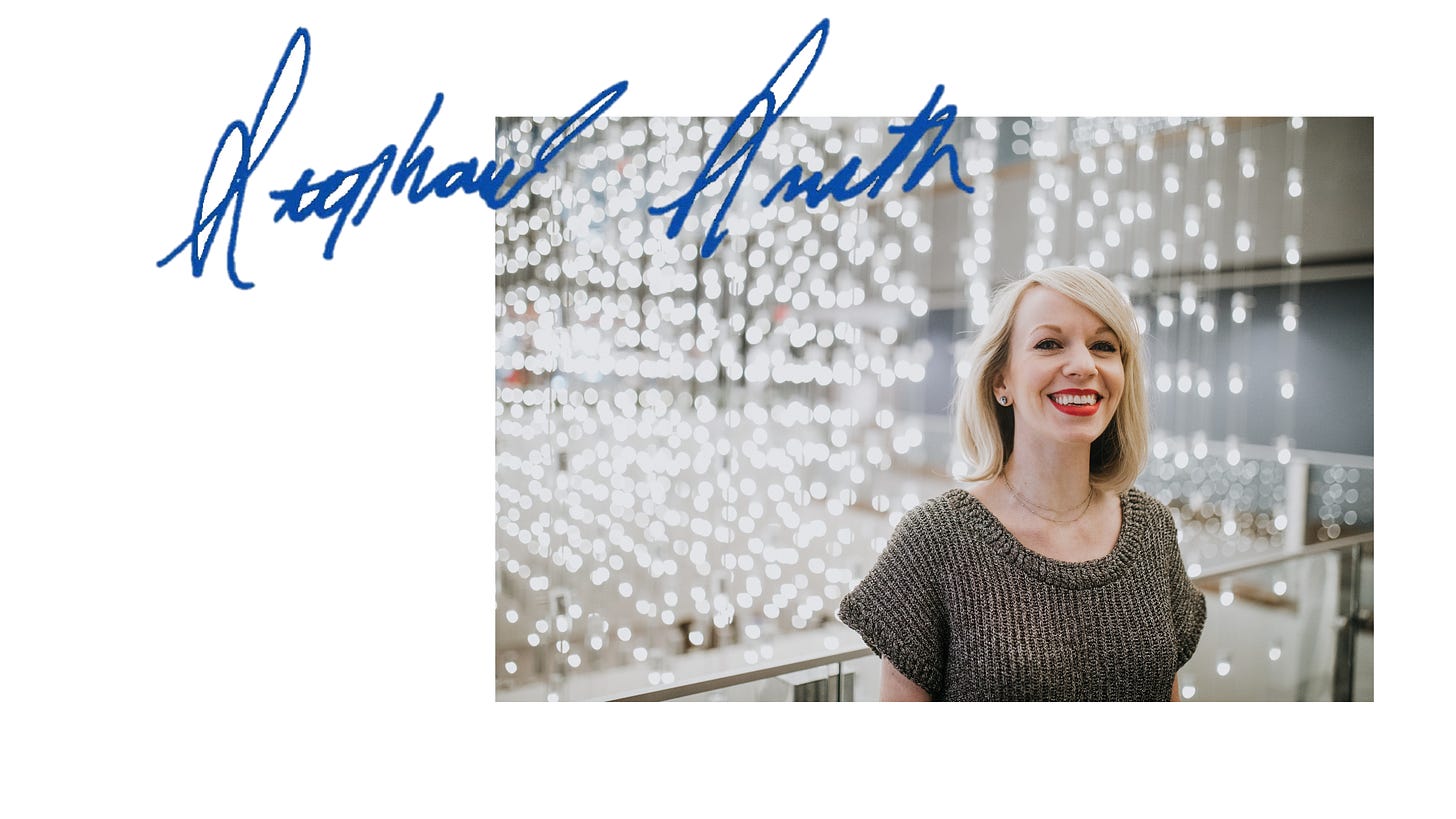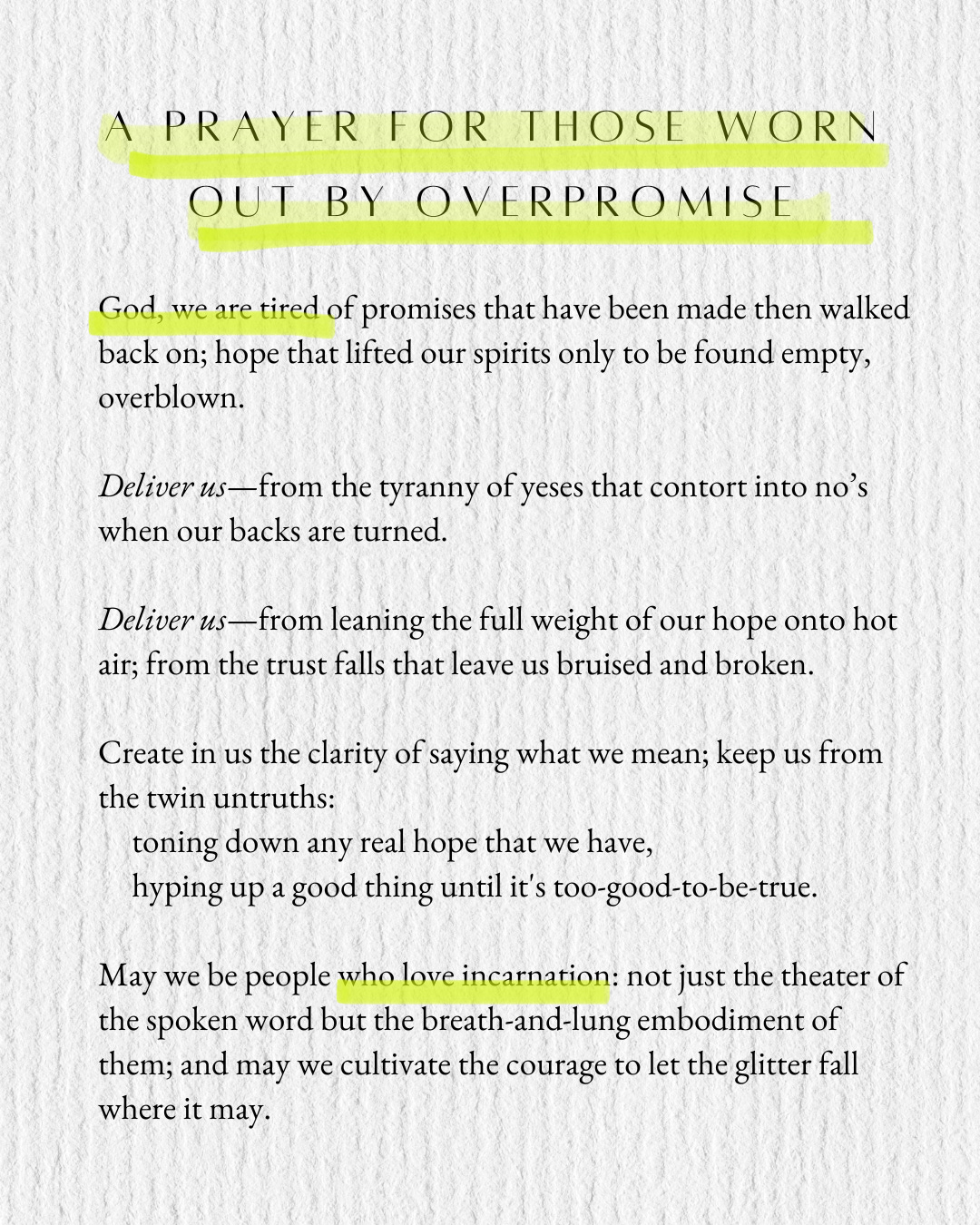SLANT LETTER: Unicorns + The Problem of Overpromising
The quickest way to erode reader trust + how to avoid it.
I recently watched WeCrashed—the fictionalization of a storied start-up and its eccentric founder. I love a good workplace drama and have had my own experiences in start-up culture and—so many thoughts!
WeCrashed is a narrative about the wake of wreckage that follows when we don’t tell ourselves the truth, and ultimately, a cautionary tale in overpromising.
The company’s founder Adam is described as a unicorn and the title sequence visualizes a unicorn in nonchalant stroll through the open office space, ultimately, its horn shattering into a thousand pieces. Adam is Icarus, flying too close to the sun. And ultimately, he is his own worst enemy—as his board of directors tell him when they finally oust him—because he makes the fatal mistake of believing his own hype.
The overpromiser believed his own empty promises, and it was his undoing.
I watched it with my husband Zach and told him, he doesn’t know how to turn it off, not even in his safest, closest relationships. With his wife, his cofounder, his father, every interaction is a sales pitch. Every encounter is an angling to close the deal. It’s exhausting to watch.
I think we all know the exhaustion of being told one thing and experiencing another. No one likes to be sold to. And when it comes to writing, nothing erodes a reader’s trust more quickly than telling them to set their expectations sky high and then meeting them anthill-low.
Many years ago, my team received a proposal that promised this book would unlock “an explosive experience of the power of God.” Is that…something I should want? An experience that comes with a red warning label and obliterates everything in its path? It was impossible to take seriously, and indeed, we did not.
This is obviously an extreme example, but for writers who want our writing to be taken seriously, who want to respect our readers by squaring with them honestly, here are some “tells” of overpromising to watch for.
Three “Tells” of Overpromising
Before and after lines that are perhaps too permanent-marker stark; premises that rely heavily on “arrival” rather than continual ebb-and-flow growth
Hype words—surefire, foolproof, revolutionary, unimaginable, yada blada
Absolutes—never, always, all, none, any language that deals in flat universalities and inevitabilities
So once you spot a “tell,” how can you bring your message back down to earth?
Welcome Nuance
The first fix is to shade in nuance wherever you can—soften the absolutes to “often,” “sometimes,” even “many” is a world of difference from “ALL.” If absolutes fail to make room for the vast spectrum of human experiences, nuance is the craft of acknowledging that any given word may be received differently person to person, gradient to gradient. Nuance is the practice by which a writer defines the borders of their angle—what you mean, what you don’t mean, with a precision that ultimately expresses respect for your reader.
Take It to the Nth Degree
I love this exercise as a test for proof of concept. Take your claim to the nth degree, stretch it to its utmost. Does it still hold up? Or does it warp beyond recognition? Or does it mostly hold, but alright, you’ve uncovered some holes that need repairing. Then you know exactly where to get to work.
Trust Your Instincts
I’ve also found that the writers who are sensitive to overpromising, who tend toward disclaimers and caveats, are the very ones who are awake to this problem, and that awareness is its own protection. If that’s you, take heart—your instincts will lead you well.
And here’s where I will practice some nuance of my own! If you’ve been around here long, you’ve heard me say a good angle, a strong slant, is the boldest statement you have to make.
I stand by that, but not if the writing is incapable of backing up such a claim. Not if the angle itself is shown through the writing to be simply hot air, no substance. Not if the hook looks great on the page but falls flat in the real world.
Ultimately, this is the unicorn’s greatest transgression: overpromising fails to incarnate. The pitch sounds incredible, but it is incapable of walking itself out of the woods and into real lives.
More nuance here. Don’t hear what I’m not saying—you need to meet your reader where they are and show them where they are going, and titling, lead lines, copy, marketing is all part of this. Do it well, do it effectively, but do it honestly.
A writer’s honesty cuts the other way, too. Maybe your tendency is not to blow something out of proportion, but to downplay. May I gently suggest hope is not meant to be self-deprecating. If you’ve got it, make it known—for all our sakes—and don’t hold back. Give it to us straight, no chaser. This, too, is honesty.
In the end, it’s hope we’re after—the velveteen-rabbit-real kind. The kind that won’t leave us in the dust after a trust fall. We can let the unicorn out the back door. After all, truth is a far more fantastical creature, if we’re brave enough to look, far stranger than fiction, and we can let it speak for itself.
Until next time,
Take heart. Write on. You got this.
If you’ve found something that speaks to you here…
Please pass it on! This letter is this editor's off-hours labor of love. Your word of recommendation is how our little community grows.
P.S. // A Blessing for Writers
SLANT LETTER is about both craft + soul care for the creative life. So for each issue, I want to speak this blessing for all of us anxious, ambitious, internet-exhausted writing folk.









This was so helpful, thanks! :)
THIS♥️-->"premises that rely heavily on “arrival” rather than continual ebb-and-flow growth".
Yes, amen. Say louder for the people in the back!